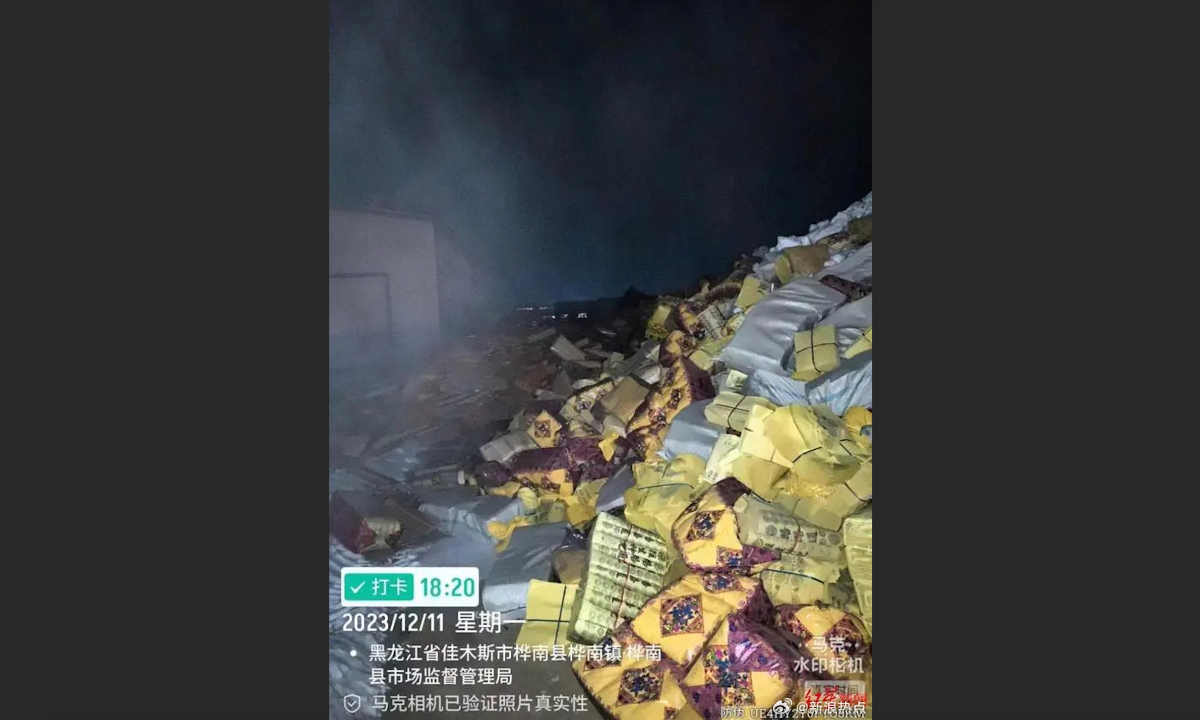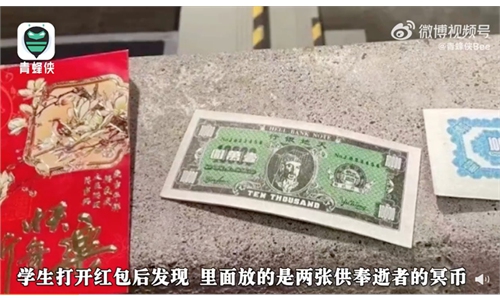County in NE China’s Heilongjiang closes down paper money shops and plants to remove fire risks

Large quantities of confiscated ghost money are piled up in the courtyard of the local market supervision bureau in Huanan county, Jiamusi city, in Northeast China’s Heilongjiang Province. Photo: Sina Weibo
The market watchdog in a county in Northeast China’s Heilongjiang Province sealed up joss paper shops and confiscated paper money in an effort to eliminate fire hazards, ahead of the traditional Chinese Winter Solstice, or Dongzhi, which falls on December 22 this year, when Chinese people burn ghost money to honor their deceased family members.
Some joss paper merchants in Huanan county in Jiamusi city, Heilongjiang, told Chengdu-based Red Star News that their shops, warehouses and production workshops were closed down and their commodities were confiscated.
Some photos provided by the sellers show that large quantities of confiscated ghost money were seen piled up in the courtyard of the local market supervision bureau.
While the local market watchdog declined the interview request from media, the local government’s citizen service hotline told the media that it was a move to remove security hazards and advocated to discard outdated superstitions.
A joss paper merchant surnamed Wang told the Red Star News that the shutting down of the paper money businesses in the county started in early December. Several major wholesalers’ shops and warehouses with particularly huge inventories have been closed down. The value of their goods amounts up to 1 million yuan ($139,237).
According to Wang, the market supervision bureau employee told him that decision to suspend paper money shops came after a fire disaster happened to a ghost money warehouse in Zhaozhou county in Daqing city, Heilongjiang. The Huanan county market watchdog took the action in a bid to remove security risks.
According to a news report by China Central Television (CCTV), a fire disaster causing seven deaths occurred in an aging wooden warehouse built illegally for storing ghost money in Zhaozhou county on November 20.
The warehouse was built with poor quality and highly flammable material which was identified for the reason for multiple casualties, thepaper.cn reported on Wednesday.
A joss paper warehouse operator surnamed Zhao from Huanan county said his processing equipment of joss paper used to produce ghost money provided to surrounding villages and towns. His warehouse was closed down around December 1 and his inventory was confiscated and that he would also be fined possibly.
According to Wang, the local authorities in Jiamusi issued regulations on the civilized sacrifices and worshipping in 2020. According to the regulations enacted on January 1, 2021, those who produce or sell feudal superstitious sacrificial articles shall be punished with confiscation of their goods by the local market supervision and administration department together with the civil affairs department. They may also be imposed a fine of with the amount of higher than one time and lower than three times the value of the production and sales.
According to a law enforcement notification issued by the Huanan county people’s government, the production and sales of ghost money, joss paper, and gold and silver ingots made of tin foil, paper figures, paper cows, paper horses and all kinds of houses, transportation tools, daily necessities, certificates made of paper and other feudal superstitious sacrificial articles, are prohibited in the administrative area of the county. Burning and using sacrificial articles are prohibited in the whole county under the regulation.
According to Red Star News, the county has carried out multiple rectification campaigns over the past two years to prohibit business of feudal superstitious sacrificial articles.
Global Times



